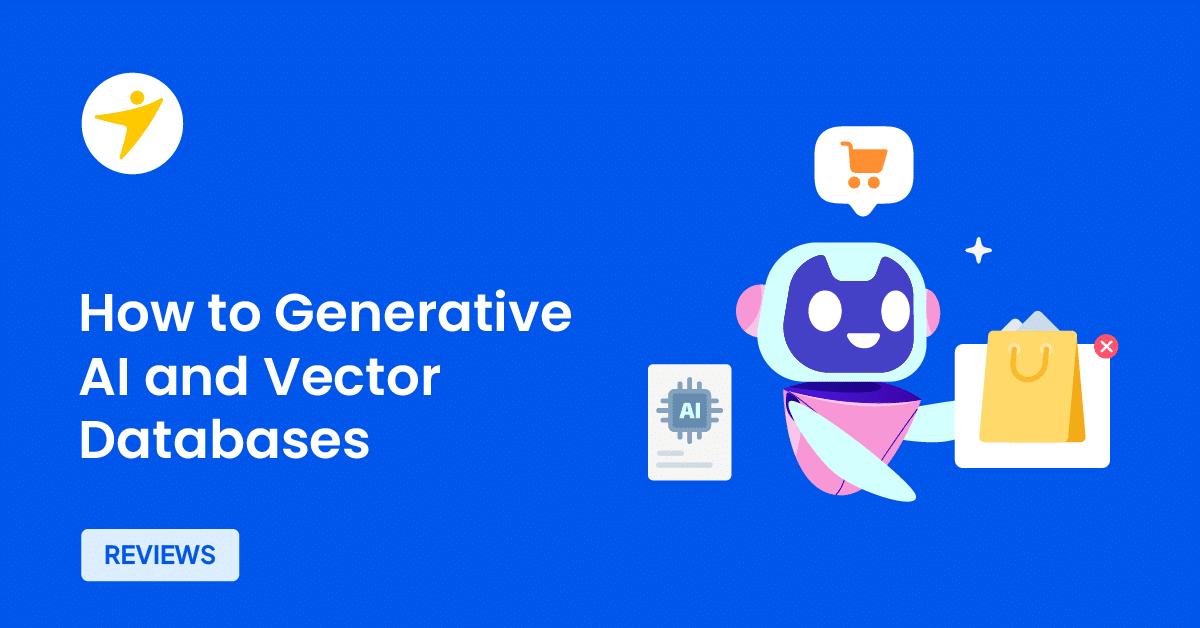With the ever-increasing convenience of online shopping, ecommerce continues to reach unprecedented heights. By 2027, Statista projects ecommerce sales to exceed $8 trillion. To stay ahead of the curve and provide exceptional customer experiences, ecommerce businesses are constantly seeking innovative technologies. Two such advancements are transforming how these platforms operate – generative AI and vector databases.

This article delves into these exciting technologies and explores how they are being leveraged to enhance various aspects of eCommerce.
Generative AI Powers Personalization and Efficiency
Generative AI is a branch of artificial intelligence mainly focused on creating new content. Here are some of its key applications in ecommerce:
- Personalized Product Descriptions and Marketing Material – Creating unique and engaging product descriptions for large ecommerce inventories can be daunting. This is where generative AI steps in, as it can automatically generate accurate and informative descriptions that cater to specific audiences or demographics. eWeek’s report on generative AI for ecommerce notes two major benefits of this strategy: it saves businesses time and resources, and ensures consistent messaging across platforms.
- Chatbots and Virtual Assistants – Chatbots are no longer a novelty in ecommerce. In another post here on the blog, Thuy Nguyen highlighted chatbots as a big ecommerce trend and discussed how their adoption is poised to grow in the coming years. Generative AI allows these chatbots to become even more sophisticated. They can answer customer queries with a human-like touch, handle basic transactions, and even recommend products, all while reducing the burden on customer support teams.
Vector Databases Fuel Smarter Search and Recommendations
Vector databases use a different approach versus traditional keyword-based search. MongoDB’s guide to vector databases explains that they store information as mathematical vectors that represent different characteristics of data. These can be anything from color and size to brand and features.

This enables a more nuanced understanding of product features and customer preferences. Below are some of its uses for ecommerce:
- Enhanced Product Search – Vector databases excel at semantic search, meaning they can understand the context and meaning behind a search query. This allows them to deliver highly relevant results, even if the exact keywords are not used. For instance, a search for “comfortable running shoes” might also show shoes with high breathability or good cushioning, even if those terms weren’t explicitly mentioned.
- Improved Product Recommendations – By representing both product and user preferences as vectors, vector databases can identify items with similar characteristics. The result is highly personalized recommendations, leading to a more satisfying shopping experience and increased sales opportunities.
- Visual Search and Personalization – Imagine searching for a product based on an image. Vector databases are now starting to enable this functionality. Customers can upload pictures of desired items, and the system can find similar products or suggest complementary items to complete an outfit or set.
How Generative AI and Vector Databases Work Together
Generative AI and vector databases can be combined to get the benefits of both. Here’s how this powerful integration can elevate the ecommerce experience:
Personalized Search with AI-Generated Descriptions – This innovation produces product descriptions that dynamically adapt to user searches. Generative AI can create descriptions highlighting features most relevant to a specific search query, while vector databases ensure the results are highly accurate and tailored to the user’s intent.

AI-Powered Chatbots with Better Customer Service – By leveraging the power of vector databases, chatbots can gain a deeper understanding of customer queries. In addition to answering questions about specific products, they can also hold conversations that consider past interactions and preferences. Incorporating technologies that transcribe video to text can further enhance this experience by allowing chatbots to quickly and accurately process video-based inquiries. This creates a more natural and personalized customer experience.
Start Using Generative AI and Vector Databases in eCommerce!
Integrating generative AI and vector databases represents a significant leap forward in ecommerce. These technologies pave the way toward a future where businesses can deliver hyper-personalized experiences, leading to increased customer satisfaction and brand loyalty. As these advancements continue to evolve, customers can expect even more innovative applications that will redefine how they shop online.

